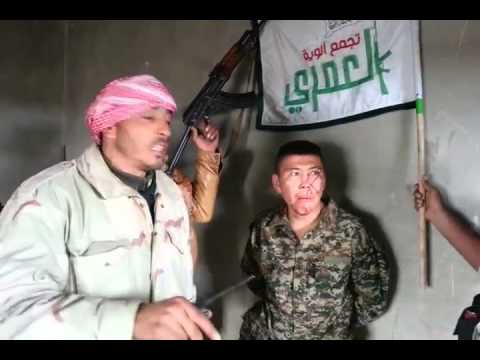Christoph Reuter reports for Spiegel Online:
Syrian dictator Bashar Assad is running out of soldiers and is forced to rely on mercenaries in his ongoing battle against rebels. Many of his foreign fighters come from Afghanistan — men like Murad, who is now being held in Aleppo as a prisoner-of-war.
His war only lasted from one dawn to the next. When the sun rose for the second time over the Syrian city of Aleppo, Murad, a farmer from Afghanistan, was still cowering on the second floor of the house he was supposed to defend to the death. That, at least, is what his Iranian officer had ordered him to do.
How, though, did he get to this war-torn city far away from his village in the mountains of Afghanistan? All he had wanted was an Iranian residence permit, he says. But at the end of his trip, he found himself fighting as a mercenary in the Syrian civil war on the side of the Bashar Assad regime.
On that morning in Aleppo, Murad didn’t know how many from his unit were still alive, nor did he know where he was or who he was fighting against. His four magazines had been empty for hours. When a violent explosion caused the house he was in to collapse, he found himself thinking about his daughters, he says. “I screamed and thought I was suffocating. And then, everything around me was quiet.”
Men arrived and pulled Murad, who was still screaming, out of the rubble. He was lucky, even if he didn’t see it that way at first. “I thought they would kill me immediately. But they bandaged me up and took me to their quarters. There was someone there who spoke a bit of Persian and he told me I didn’t need to be afraid.”
That was seven months ago. Since then, Murad and another Afghan have been sitting in a makeshift prison belonging to the “Damascus Front,” one of Aleppo’s larger rebel formations. They are being held in a neon-lit basement, next to a roaring generator. The walls are crumbling, a product of the myriad explosions that have shaken the city. In addition to Afghans, Pakistanis and Iranians have also been taken prisoner by other rebel groups, all of them fighting on the front lines.
The war in the northern-Syrian city of Aleppo — but also around both Hama and Damascus and down to Daraa in the south — has taken on an Afghan face. Or, to be more precise, a face with distinctly Asian features. Many of those Afghans that have been sent into battle come from the Hazara, a Shiite minority that are the poorest of the poor in Afghanistan.
A captured Afghan fighter after a failed regime offensive in southern Syria last month:
Covering Assad’s Lack of Soldiers
The Assad family dictatorship is running out of soldiers and is becoming increasingly reliant on mercenaries. Indeed, from the very beginning the Assad regime had an opponent that it could never really defeat: Syria’s demography.
In order to prevent the collapse of Syrian government forces, experienced units from the Lebanese militia Hezbollah began fighting for Assad as early as 2012. Later, they were joined by Iranians, Iraqis, Pakistanis and Yemenis — Shiites from all over, on which the regime is increasingly dependent. But the longer the war continues without victory, the more difficult it has become for Assad’s allies to justify the growing body count. In 2013, for example, Hezbollah lost 130 fighters as it captured the city of Qusair and has lost many more than that trying to hold on to it. Indeed, Hezbollah has begun writing “traffic accident” as the cause of death on death certificates of its fighters who fall in Syria.
The Iraqis have almost all returned home. Rather than fighting themselves, they largely control the operations from the background. The Iraqi militia Asa’ib Ahl al-Haq, for example, organizes the deployment of Pakistani volunteers in Syria. But no ethnic group is represented on all of the regime’s fronts to the degree that the Afghan Hazara are. Exact numbers are hard to come by, but some 700 of them are thought to have lost their lives in Aleppo and Daraa alone. What’s worse, most of them don’t come completely on their own free will.
Up to 2 million Hazara live in Iran, most of them as illegal immigrants. It is an inexhaustible reservoir of the desperate, from which the Pasdars — as Iran’s Revolutionary Guards are called — have recruited thousands for the war in Syria over the last year and a half.
Forty-five year old Murad Ali Hamidi, the man who is now sitting in the Aleppo prison, was previously a farmer in the northern Afghanistan village of Chaharzad Khane, or “400 houses”. He had a small field measuring 50 meters by 50 meters (27,000 square feet), but there was no electricity, running water or school. He fled to Iran without valid travel documents and worked illegally in a rock quarry — until he was arrested in Septmeber 2013. “They accused me of selling drugs, but that isn’t true,” he says. For 15 days, he says, he was whipped with heavy cables and beaten.
A circular scar on his back would seem to provide evidence for his story that he was also burned with a cigarette. “They are racist in Iran. They don’t want us only because we are Afghans. Hardly any of us received refugee papers.” Such credentials would have allowed him to at least send his children to school and to receive some food.

